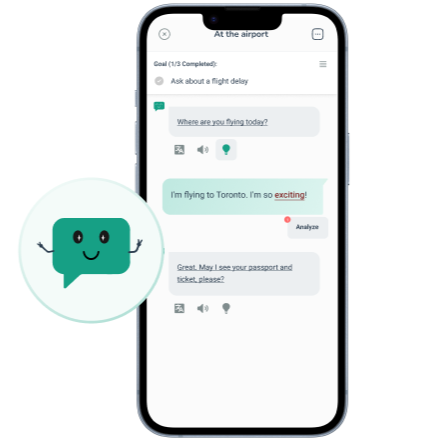
Download LingUp to continue the roleplay and get instant feedback on your grammar and pronunciation.
Try LingUp Now!Start with the nasal sound /ɪn/, your tongue touching the roof of your mouth.
Move to the diphthong /aʊ/, opening your mouth wide while rounding your lips at the end.
End with /ntɚ/, where your tongue touches the roof again for the 'n', and then rolls back slightly for the 'tɚ'.
en-count-er (incorrect stress)
in-coun-ter (not emphasizing 'kaʊ')
en-coun-tar (incorrect vowel ending)
Start with the nasal sound /ɪn/, similar to American.
Move to the diphthong /aʊ/, keeping the sound light and rounded.
End with /ntə/, letting the 't' be crisp and finishing with a schwa.
en-count-er (incorrect stress)
in-coun-ter (not emphasizing 'kaʊ')
en-coun-tuh (incorrect vowel ending)
The stress is on the second syllable, 'coun'.
Many British English words end with a schwa due to relaxed vowel sounds.
Use a short, nasal sound /ɪn/, with your tongue near the roof of your mouth.
A meeting or experience with someone or something.
/kaʊnt/
To determine the total number.
/ˈkaʊntər/
A surface for work or transactions.
/əˈkaʊnt/
A report or description.
'Encounter' has three syllables, while 'count' is one syllable.
'Encounter' has a nasal start, unlike 'counter'.
'Encounter' begins with /ɪn/, differing from 'account's start with /ə/.
Always place stress on the second syllable, 'coun', for clarity.
Practice 'aʊ' regularly, as it's common in English words.
Test Your Pronunciation On Words That Have Sound Similarities With Encounter
Test Your Pronunciation On Words Within Other Categories